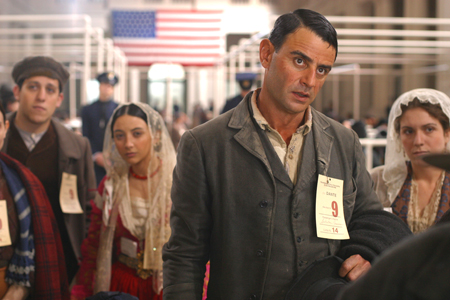|
Reviews of Recent Independent, Foreign, & Documentary Films in Theaters and DVD/Home Video
Written & Directed by: Emanuele Crialese. Produced by: Alexandre Mallet-Guy, Fabrizio Mosca & Crialese. Director of Photography: Agnès Godard. Edited by: Maryline Monthieux. Music by: Antonio Castriganò. Released by: Miramax Films. Language: English & Italian with English subtitles. Country of Origin: Italy/France. 112 min. Rated PG-13. With: Charlotte Gainsbourg, Vincenzo Amato, Aurora Quattrocchi, Francesco Casisa, Filippo Pucillo & Vincent Schiavelli. A cinematographer’s director, Emanuele Crialese makes the star of his new film his director of photography, Agnès Godard, who had previously provided the atmosphere – and pulse – for Claire Denis’s Friday Night and The Intruder. Crialese’s visually riveting and intimate epic begins with the wiry and rugged Salvatore (Vincenzo Amato) and his handsome 16-year-old son climbing barefoot up a mountain, a misty valley in the background, with each carrying a rock in his mouth. Laying down his stone on a mountaintop shrine, the father preys for a sign to determine whether he should uproot his family for the New World. Godard’s saturated colors bring out the black grime in the peasants’ fingernails and the brightness of the sunburned barrenness of the early 20th century Sicilian setting. Novelty postcards from America, squirreled away by his younger son, deaf-mute Pietro (Filippo Pucillo), determine his decision: one is of a cart loaded with a humongous onion, and another depicts giant coins sprouting in a bush. Salvatore sells all of his livestock and, with his family, abandons their stone dwelling for a journey to America in claustrophobic third-class steerage. Often beautiful but never opulent, the visuals dominate the terse story line with characters straight out of Central Casting: the humble and illiterate peasant, Salvatore; his wizen superstitious mother, Fortunata (Aurora Quattrocchi); and the seemingly simple-minded Pietro, first introduced with a number of snails crawling in his curly hair. Composed of many compelling, often dialogue-free sequences, the film boasts a masterful and sure-to-be-famous moment – a static overhead shot of the ship’s deck, crammed with passengers, as the vessel silently and gradually pulls away from the dock. However, a few times the camera lingers a bit too long and too lovingly on the compositions. After a violent storm at sea, the immigrants lie scattered on the floor below deck, bodies intertwined. The chiaroscuro-lit tracking shot seems more concerned with the film’s look than anything else. Additionally, Salvatore’s surrealistic visions jar, not because they break from the gritty depiction of migration, but for their literal depictions: after one passenger asserts that rivers of milk flow in California, Salvatore imagines himself bathing, clothes and all, in milk. However, when the family lands at Ellis Island, the script’s simplicity pays off, forcefully capturing the immigrants’ bewilderment as they are pushed through the bureaucratic maze like cattle, tested for intelligence and thoroughly physically inspected. The immigration law at the time allowed the exclusion of “all idiots, insane persons, paupers or persons likely to become public charges and persons suffering from a loathsome or dangerous contagious disease,” obviously calling into question today’s immigration criteria in the US and European countries. The film concludes at this point in the family’s journey, after their abrupt initiation into the modern world.
The film’s U.S. release indicates that the Motion Picture Association of America has reformed under its new reform-minded president and CEO,
Dan Glickman. It would have been unthinkable a year ago for a film with full-frontal nudity, however brief, to be rated PG-13. Hardly “graphic,” as
labeled by the MPAA, the film depicts the new arrivals undressing for medical examinations and, in a scene where Fortunata witnesses a miracle
of modern plumbing, a shower.
Kent Turner
|

